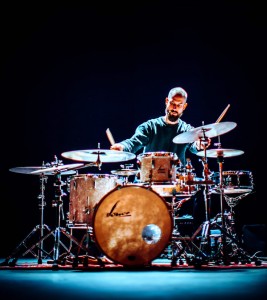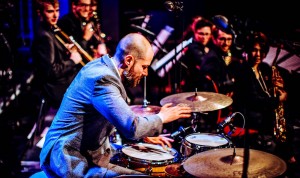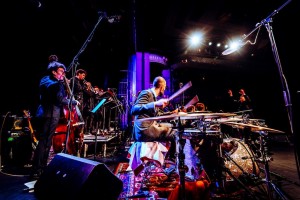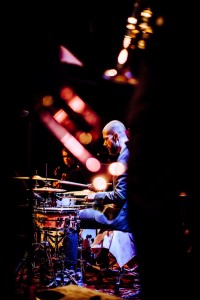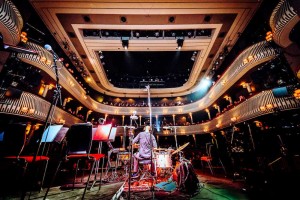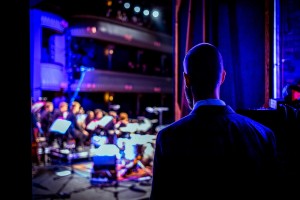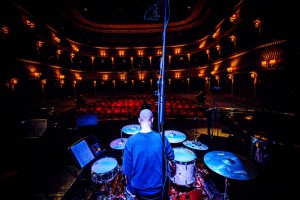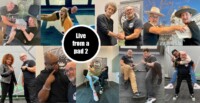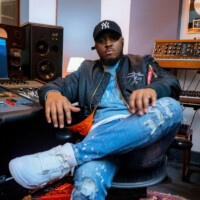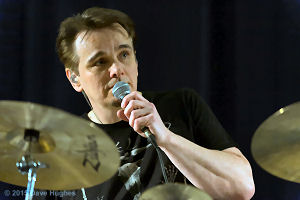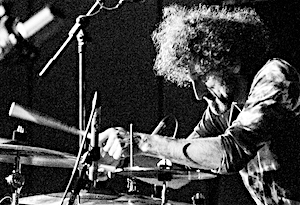It was a quirky little solo album named ‘Grebfruit’, which involved only vocals and drums, that put Benny Greb on the map of the international drum scene – and he hasn’t left ever since. On the contrary, his tasty grooves, unique sound and passion for experimenting has brought him to the top of the list.
While mainly writing and touring with his own band Moving Parts, Greb’s passion for education sees him travelling the world for clinics, camps and masterclasses and has earned him titles as drum educator of the year a couple of times. His two best-seller DVDs ‘The Language of Drumming’ and the more recent ‘The Art and Science of Groove’ have inspired and influenced a whole generation of drummers and managed to break down intricate topics for musicians of all abilities.
I caught up with Benny in London to chat about his upbringing, his band Moving Parts, his passion for education and… wait for it … Grebfruit 2!
You started off on piano and all kinds of instruments before you got into drumming?
Well there was a piano around in the house; my brother played piano so I tried it too but the first real lessons I had was on trumpet. Almost at the same time, when I was six years old, I did enough nagging and getting on my parents nerves that I got a toy drum kit. I didn’t have a teacher for quite some time; I was self-taught till I was 12 and then had two different teachers. Somehow there was this ‘self-taught thing’ where I checked out songs and stuff that I liked and there were the lessons which were more traditional kind of snare drum stuff, some dance rhythms like a tango and all that – but it never really meant that much. I had a punk band so the standard stuff my teacher did with me really felt like music lessons. It felt like it was stuff that you have to do and then you do the fun stuff yourself.
When the teaching relationship with my second teacher ended – he said: “Well, I’ve showed you all the beats” – we had a ‘goodbye evening’ of chatting and watching videos. He showed me a Buddy Rich tape, and that was actually the beginning of me really taking this seriously, seeing how much more there is you can do and understanding that I really have to practise. I was about 16 back then but that was really the decision that I wanted to do drums as a career.
You got put off drumming a bit by the “Bavarian environment of Oom-Pah music”?
The first teacher I wanted to get was in the local Oom-Pah band – Blasmusikverein – and he was just unfriendly, not very social and just scared me away. I remember it like it was yesterday: after my mother had a very enthusiastic and nice monologue about “He wants to do this and that”, he just ignored her, looked at me and said: “The first three years we’re only gonna do snare drum”. Ok, I’m out of here.
I sometimes ask myself what would have happened if I would have had a cool, attentive, caring and good teacher from the very beginning. The funny thing is that while I had these trumpet lessons and I played these other instruments, drums always was my instrument. With the other ones it was always a ‘you’ve got to do this and that’ but nobody told me what to do on drums for a long time. It was my thing and I think I got a very close relationship to the drums because of that. I’m thankful for that. I just tried to catch up on all the technical stuff later on.
There are lots of videos of you trying things like putting a LP on your snare or experimenting with this and that sound. Do you think that’s hanging over from those days where you could just do what you wanted?
Maybe yes. I just love trying out stuff. I spent a lot of time in practise rooms and I love this meditative thing of spending time with the instrument. The moment when you get bored is such a great opportunity. I learned this now again with my son. Many parents try to prevent their children from ever getting bored but it’s usually great. When a child gets bored there is this hump they get over and then they have a great idea and come up with something else to play. I’m not saying bore your child but I think especially today it’s important to not just hope for a new email or a new cat photo but to accept that it’s just fine as it is – and then something comes up. There has to be space for ideas, so the absence of input sometimes is a great thing. We always think we need input to channel something but we have so much stuff inside us already and I try to search for these. So to answer your question: through limitation I usually discover a lot. When I sit at the drum kit I think about what I could do with just hands; what can I do with just the snare drum; what can I do with just quarter notes – and then great things come out. I experiment in that way a lot.
Where did it go from there? What made you move to Hamburg?
First I went to Dinkelsbühl and studied music there because it was the first school where you could study jazz/rock/pop drums without doing mallets, timpani and all that stuff. It’s a great thing but I really wanted to focus on the drum set.
During my last year in Dinkelsbühl I did a course called ‘Kontaktstudiengang für Popularmusik’ – translate that [laughs] – in short: a pop course at the university for music and theatre in Hamburg. The structure of the course was that people who didn’t know each other would form bands and do a concert at the end. A band called ‘Otterpost’ was formed there which was my first band to get the interest of producers and record companies. We got a record deal and I was like: this is it! I’m gonna become famous! So all of a sudden I had a response in Hamburg that I never had anywhere else.
At that time the question was if I should go back to Bavaria and Dinkelsbühl or if I choose one of the music cities. Back in those days in Germany these were Cologne (because of all the broadcasting), Berlin kind of started to become something and Hamburg which had all the record companies, print media and a lively music scene. Funnily enough when I moved to Hamburg a lot of the record companies went to Berlin, hopefully not because of me. A lot has moved to Berlin now and I’m not sure whether I would now move to Berlin too if I had to make the decision again. I think Hamburg is more beautiful and has better air though.
So was ‘Otterpost’ the breakthrough?
Well it was even better because it wasn’t the breakthrough. I thought it was a breakthrough but then it went to sh*t. It was a great gift that it didn’t go as planned because we wrecked our brains about having rehearsals three times a week, putting out demos, going to parties with A&Rs and all that. Everyone had an opinion – usually a pretty stupid and uninformed one. It was crazy. There was one guy who said: “This is a great song. I would run with it but there should be a little guitar “bambabam”…”. We recorded a guitar on it and a month later when he listened to it he went: “Guys, this is great if you just take the guitar out”. We had so many experiences like this where we just tried to somehow make it happen. The important thing is this: while studying music in my mind I loved jazz and weird music (and the music I was writing was pretty weird), but I shoved that underneath the table because everybody told me the goal is to play in a big pop band and for big acts. This is where you earn the most, where you’re most happy, that’s the definition of success. Coming closer to that working with Thomas D and Mark Forster was great, but I had a few other contacts, who’s names I won’t say, which were big pop acts and were an absolute disaster. It wasn’t enjoyable personally, it wasn’t paid well and musically it wasn’t very good. At the same time I had written a very weird experimental album with just me singing and playing drums that I put out myself and didn’t think much would happen with it. So on one side I was very disillusioned with the whole dream of being in the pop business, but on the other side the first moment I focused a little bit on my passion and love, it actually got a lot of resonance. Then I played a couple of solo shows that all went really well and I started to think: Wow, maybe this could work. More and more since then I trusted my intuition and listened less to the “I’ve got to do this / I have to play with that artist”.
I did another thing in Hamburg that really was a game-changer for me
When I came to Hamburg I tried to fill my calendar with just being a musician. The first goal was to be able to live from making music. Then I realised that I’m miserable and depressed and decided I had to change something. I called up lots of contacts I had, mainly the pinnacle guys who are responsible for booking musicians for cover bands and corporate functions, and said listen: I loved playing with you but I will never do cover music ever again. They went: “Are you out of your mind? What are you talking about?”. I told them they could call me if they had original material that they would like to play with me, but I had decided not to do cover gigs anymore. Those were a couple of tough ‘boiling the soup twice’ kind of months but it enabled me to have space and time again to write my own music and do a little bit of education stuff. The last ten years have been a gradual finding myself. I do enjoy the occasional studio gig but I got more and more closer to myself.
And it seems to be going very well. You won the Echo Jazz price last year which is basically the German version of the Grammys. Was that linked to a specific piece of work?
Yes, the category is always linked to a release. I won it as best drummer/percussionist 2016 because of the Moving Parts Album.
How come the jazz background. Germany does have a big jazz scene but Bavaria isn’t necessarily known for that.
It was just my love for it. Sometimes late at night there were some jazz gigs on Arte or 3Sat (German TV channels) and it just had a certain attraction to me. It was weird because when I was 15 I had a time where I played in a punk band and in a big-band and I loved both. I never thought so much about different styles, it just had to have energy. Actually some of the punk and big-bands have very similar energy. Big-bands were the loudest music back then. It was the hippest stuff because it was in time with the prohibition, there was drinking, dancing and it was the loudest available music. And it was revolutionary, it was against the establishment. That’s why jazz and funk is called like that, they are not nice names. It’s just now that we have a different view and many universities teach those rules now and people get afraid. “Play nice and quiet” – those guys didn’t play nice and quiet at all, it was full on. I loved it.
As I said, hearing the Buddy Rich stuff really changed my life – mainly in terms of discipline. I saw some video of Buddy playing and then these other drummers played with his band – it was the Buddy Rick memorial scholarship concert. I realised three things right away; The first was: Ah, I like this; the second thing was: I can’t do this, it’s very hard, I don’t understand anything they’re doing; the third was: it doesn’t seem to be hard for them. They were focused and it was intense but it was the first time that I ever understood the phrase “play music”. It was like children playing basketball or tennis. There was back and forth, there was interplay and they had a certain mastery. So I knew I’d have to work hard, it wouldn’t come easy and would take time for me but I wanted to get to a level where it is easy for me. The result of that was, even when I was only 15 or something, I got to kick it up a notch and really have to practise. That was a really defining time where actually I didn’t go to the pool when other people went “Hey, it’s nice weather outside” – nah, I’m gonna stay in and practise.
We’ve mentioned your band Moving Parts already. You’ve recently changed the line up and went ‘UK’ and a little more electronic?
Yes, I just kept hunting for players and the London jazz scene has something that has a very interesting subculture dirtyness to it and at the same time just has great players. I needed great improvisers because I really wanted a band that is like a moving… erm… part [laughs] to create something that can change in the moment. When you need improvisers you would think jazzers but on the other side I need guys for whom good pop, rock or electronic music is not a bad word. They appreciate it and love the Beatles and Aphex Twin. It’s not easy to find guys like that; definitely not in Germany anyway.
I played in a band here in London for a film composer, we did some tours and two albums, which is where I met Chris Montague (guitar). We put out heads together and had the band with Kit Downes (keys) for a couple of years. Kit then got a contract with ECM for some solo stuff which has always been his dream. He made a musical Brexit so to speak and I completely understand it.
It’s important for me to have guys I really want to play with and I need someone who when I get a jazz festival or a tour in China, the guys are up for it.
It was a blessing in disguise. Fatty (Chris Hargreaves, now on Bass) is an incredible guy, incredible player and a great producer as well. I like people in mind who are band leaders themselves because you get such a high level in overview and musicianship. It’s not about the playing only, it’s also about how to pace yourself and how it all should sound. I think with Chris and Chris, I now have two people who really can carry this forward.
It’s just great to have a live band now that can evolve, is a home for my ideas and at the same time has a great democratic synergy that can produce things that are greater than what I could ever come up with.
Your breakthrough was probably your first solo album ‘Grebfruit’ which just consisted of you drumming and singing. Now you just announced Grebfruit 2?
Yeah, that’s right. Two years ago I realised that it had been ten years since Grebfruit had come out. Of course it took a long time to record it too. I thought a little bit about it. I had my hands full with the band but I just had to do something. Songwriting wise, arrangement wise, rhythmically, technically and producing wise I am better than I was back then. A lot of time and projects have passed, Grebfruit was my first attempt. I’m proud of it but I just realised we really could kick it up a notch. I caught myself having this thought a couple of times over the last year where I was like: Man, the stuff we could have done if I had known what I know now; and if I would have known Sven, my producing partner, who is an incredible guy. I decided that after the Moving Parts live album is out and before we start writing new material with the new Moving Parts line up, I’ve got to take time for Grebfruit on steroids basically. Back then many of the songs were like a quartet arrangement of a small a cappella group scene in my head with a drum set. Now we have 60-70 voices plus drums. We really went completely crazy and I’m super proud of it. It was much more work than I thought but it just had to be done. It’s gonna come out beginning of July.
You’re also one of the top educators out there. Your two DVDs I’m sure have changed a lot of drummers lives. At the moment your focusing more on Clinics and Drum Camps?
I have a book in the works as well at the moment about efficient practising but that’s a long process. I have to do a lot of research and test it on myself first of course, then I have to test it on other people to really make sure: first of all I know what I’m talking about; secondly that I now it will benefit other people; and thirdly that I then find an elegant way to organise that information and present it in the best way possible. As Einstein said: “It’s good to make everything as simple as possible, but not simpler”. I really try to do the subject I talk about justice but with the most amount of simplicity and clarity. That’s what I’m working on right now.
In terms of teaching my love child is those drum camps, which for me is the best version of giving lessons. People always ask me if I give lessons… nah, but I do these camps. I have one in New York every year, one in Germany and I have these satellite camps around the world. This year one in Italy, one in Japan, Mexico and so on. I don’t do many of them and they are limited to a max of 25 people and they’re sold out for this year but we’re gonna put out the new dates in summer. It’s always great! There is one about sounds where I get my engineer in, we record everyone, everybody has to tune, I send them off in separate rooms with heads and toms and we all listen to the outcome, we listen to different mics… all of that. Then there is one about practise efficiency where we write a practise plan for everyone. We have one about hands and feet which is about all the stuff you can think of regarding coordination. Oh, and one about time and groove, which is basically what the DVD then became.
I’m very happy about those, it’s always a great time. Last time we had 25 people from 14 different countries. That alone is just an amazing experience to have.
Teachers sometimes say “Eurgh, the students don’t wanna practise; the youth of today…” – I can just say I’m constantly so inspired and hopeful seeing these young, intelligent, amazing players being smart, talking about politics, about social issues, the environment, musicianship, teamwork… . It’s really great to experience something like this after a week of twitter messages by Trump. For me it’s very encouraging.
Sometimes people are very disappointed that the camps sell out that quickly so I want to make sure everyone knows about them. I don’t want to do too many of them because I want to still look forward to them – it’s a little bit egoistical, I know. The thing is that education is not a business for me. Of course I earn money from it but I don’t want to treat it as a cash cow because I think that usually weakens the content. A lot of the online stuff is about new material and I question the fact that the best education means constant new input. I wanna have the best input. I don’t wanna have the newest car or phone, I want to have the best car and the best phone if possible. I think this whole neo-liberalistic capitalism bullsh*t that is new stuff, more stuff – you get more on this site, you get an extra CD – I don’t want an extra CD. If I have four songs that change my life, leave away the other ones. So yeah, I do these camps and really prepare for them. I send out questionnaires in advance, the students send answers back and I prepare for them and I’m always proud afterwards. I want to have the feeling I did a good job and was enthusiastic about it.
Working on your own stuff, recording videos, some pop stuff, Clinics, working on the new book, being a dad – how do you do it all? Where do you find the time?
I ask guy all the time for time management ideas and tools. I’m very much a student of efficiency, which is our German stereotype or course. There is efficiency and there is effectiveness. Efficiency is sometimes easy but I want it to be fulfilling, which you then might call effective. Many people say they’re ‘busy’ and that they ‘make progress’ and they’re really proud of that but I want to know that the progress is in the right direction. That’s my main goal – and then I want to be efficient about it. I don’t just wanna run somewhere, I want to be aware of where I am, what I want and basically do what I wanna do, when I wanna do it, with the people I like. We talked about the definition of success earlier and how playing for big acts seemed important, now I have this as a definition.
I always have a three year plan, a yearly plan, a quarterly plan, a monthly plan and a weekly plan – so I really take time to reflect set goals and take a look at all the aspects privately and professionally and try to grow in all of them.
The habit of constant learning is just the most amazing thing and I really establish the habit of constantly learning and improving. There is this way of goal setting and improving where you’re miserable now and you have to change, because it’s bad and it has to be better. From that sometimes comes the feeling of ‘I have to feel bad in order to have a motor to become better’. I had this in my teens where I sometimes put pressure on me and made myself miserable to become better. I’m now a little wiser to try to find a balance between trying to be really happy in the right now and still push while also enjoying the process. I got better at enjoying the process over the last couple of years.
You have an interesting hobby to balance it all out: Woodwork (no pun intended).
I read in a book that it’s a magical process to write stuff down, that it does something very different than typing something in and that it organises your thoughts in a different way.
Working with your hands is such a healing thing. Holding sticks in your hands is great but many parts of my job…. That’s actually another illusion that I had: when I become a drummer, I play drums all the time. That’s the only thing I’ll do! But I sit in front of the computer a lot, I sit in planes, hotel rooms and to just build a little wooden house for my son or find any excuse to just repair something is just great. I’m not great at it, I’m not an artist but the process is just great. I just love this material and the smell of it. Also, in that field there are incredible artists to discover too. I love it, it’s a great balance and it’s also a great hobby to share with my son.
Finally, what’s next?
Very next is I’m playing with this amazing big band today (RCM percussion day). I’ve been waiting a long time for a big band to ask me to play Buddy Rich stuff with them. It’s quite a treat. I did another big band show in England in June for the Worlds Greatest Drummer event. Grebfruit 2 will come out in July, that’s the next release. It will be available on vinyl as well by the way. We recorded some videos of the songs which Meinl will release over time.
The drum camps are happening over summer; we’ll write new stuff with Moving Parts at the end of the year, go on tour in China and play some jazz festivals; I try to finish the book by the end of the year. Oh, and I’ve developed a new cymbal for Meinl. It’s a little Hi Hat comprised of four cymbals… because we can [laughs]. You know these crashers with the bend metal plates which hit each other and rattle around when you hit them? I love that sound but I wanted to find some way how to get that sound combined with a more defined, shorter Hi Hat sound but still have the ‘trashyness’. So I tried to build a ‘trasher hat’ basically and it’s comprised of a normal mini Hi Hat that’s very thick so it sounds very short and almost dead; then there is a donut looking, straight metal piece and another cymbal on top. When you hit it, it hits the other cymbals. It’s a very unique and beautiful sound and enables me to get an almost ‘shaker’ kind of sound. These are coming out at the Meinl Drum Fest which I am also playing at [which was last month so these products are now released]. And I brought out a knee pad and bass drum pad with Meinl, so that’s a drum set I can take anywhere.
Vielen Dank Benny!
Interview by Tobias Miorin
July 2017
GREBFRUIT 2
available at www.bennygreb.com or iTunes

